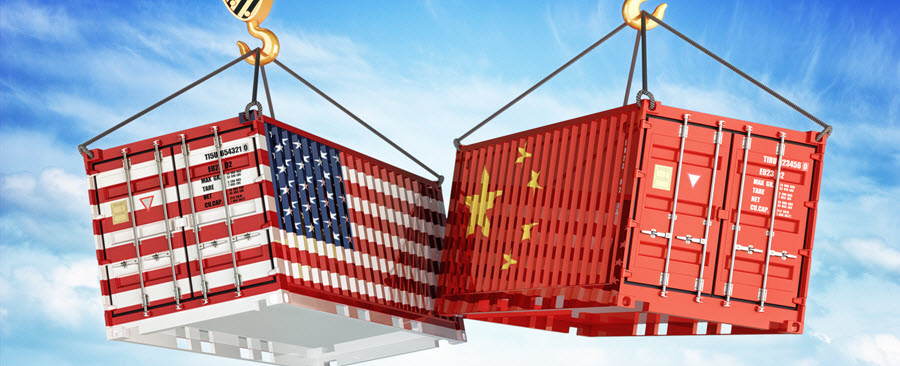Why China Matters: Friction in U.S.-China Trade Relations
Written by The Content Team
Published on September 17, 2018
minute read
Share:
As Canada continues intensive trade negotiations with the U.S. at the NAFTA table, U.S.-China trade friction looms in the backdrop. The world's two largest economies have been embroiled in a trade dispute for the last few months, swapping tariffs, threatening more and giving many — including investors — pause along the way. Let's take a look at where U.S.-China trade relations stand today and why keeping an eye on the Chinese economy is important.
Why China Matters
Eric Lascelles, Chief Economist at RBC Global Asset Management (GAM), refers to China as "the main act" in global economics today, in large part because China is responsible for one-third of global economic growth. That means that what goes on in China contributes hugely to the relative strength of the global economy as a whole.
"We need China to keep moving — not faster than it can — but it's important that China grows," says Lascelles. "If China stumbles, as it seems to have done recently, that is an issue of some consequence and it's the reason we have downgraded our growth forecast, not just for China, but globally and for the U.S."
The team's protectionist expectations around trade are now slightly more pessimistic. Lascelles views "negative" and "slightly negative" as the most likely scenarios, with the former meaning a "substantial" increase in tariffs and the latter meaning several small tariffs.
Where Do Things Stand?
Interestingly, China reported a record high trade surplus with the U.S. in August. The two countries have been swapping tariffs at roughly the same rate recently, which impacts both imports and exports, so an upward shift in the surplus wasn't a given. The U.S. has already put US$50 billion in import taxes on industrial parts, machinery, chemical products and more, in addition to the tariffs on steel and aluminum, and on goods such as washing machines and solar panels that enter the country from China. U.S. trade data shows iron, steel and aluminium imports from China were down significantly in July, a clear sign that the tariffs currently in place are having an impact.
The U.S. has now announced tariffs on another US$200 billion worth of Chinese imports, leading China to retaliate with plans to implement tariffs on US$60 billion of U.S. products. The U.S., meanwhile, has threatened to add a further round of tariffs totalling US$267 billion.
Beyond the recent lobbing of tariffs, there are many longstanding sources of friction between these two powerful countries. Here are a few of the key complaints as outlined by the GAM economics team:
U.S. grievances with China:
- Trade surplus
- State-owned enterprises
- Joint-venture conditions
- Theft of intellectual property
- Capital controls
- Currency manipulation
- China challenging the global order (e.g., spearheading regional initiatives such as One Belt One Road and Asian Infrastructure Investment Bank)
China's grievances with the U.S.:
- Tariffs
- U.S. influence in the Pacific
- Control of global order (e.g., the powerful role the U.S. plays in the functioning of World Bank, United Nations, International Monetary Fund etc.)
Recent trade posturing has brought these longer-term issues back to the forefront.
"This is going to be a generational thing," says Lascelles. "We're not likely to see this competition resolved in a day or a month or a quarter. It is going to last for years and probably decades."
This article was updated on September 18, 2018.
RBC Direct Investing Inc., RBC Global Asset Management Inc. and Royal Bank of Canada are separate corporate entities which are affiliated. RBC Direct Investing Inc. is a wholly owned subsidiary of Royal Bank of Canada and is a Member of the Investment Industry Regulatory Organization of Canada and the Canadian Investor Protection Fund. Royal Bank of Canada and certain of its issuers are related to RBC Direct Investing Inc. RBC Direct Investing Inc. does not provide investment advice or recommendations regarding the purchase or sale of any securities. Investors are responsible for their own investment decisions. RBC Direct Investing is a business name used by RBC Direct Investing Inc. ® / ™ Trademark(s) of Royal Bank of Canada. RBC and Royal Bank are registered trademarks of Royal Bank of Canada. Used under licence. © Royal Bank of Canada 2018. All rights reserved.
The views and opinions expressed in this publication are for your general interest and do not necessarily reflect the views and opinions of RBC Direct Investing. Furthermore, the products, services and securities referred to in this publication are only available in Canada and other jurisdictions where they may be legally offered for sale. If you are not currently resident of Canada, you should not access the information available on the RBC Direct Investing website.
Explore More

Here’s What Every Canadian Should Know About Estate Planning
Insights from Leanne Kaufman to help you feel more confident as you plan
minute read

3 Things We're Watching This Week
What the Inspired Investor team is watching
minute read

What’s Driving the Recent Surge in Gold Prices
Here are some things to watch with the gold market
minute read
Inspired Investor brings you personal stories, timely information and expert insights to empower your investment decisions. Visit About Us to find out more.







